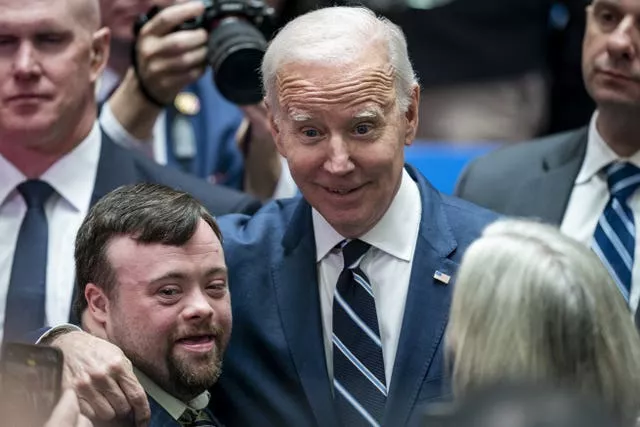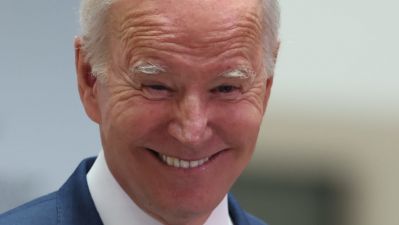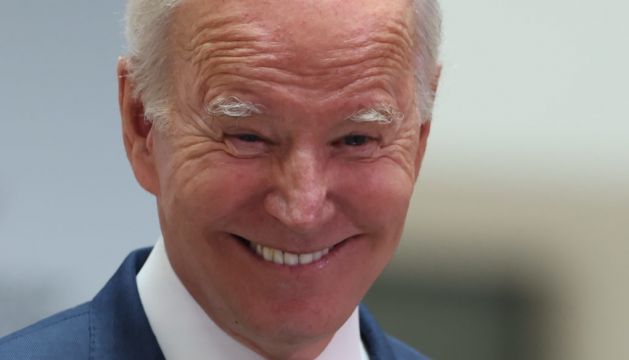Joe Biden’s stay in Northern Ireland may have been short, but the message he left behind him was clear.
Speaking in a much-anticipated address in the new £350m Belfast campus of the Ulster University, the US president predicted a bright economic future for the region, but linked it with the return of stable government.
Much of the attention before his visit had focused on the brevity of his stay, and the fact that the president had declined an invitation to make an address at Stormont as part of his trip marking the 25th anniversary of the Good Friday Agreement.
However, the cornerstone of that agreement, the powersharing Assembly, is currently not operating due to a protest by the DUP at post-Brexit trading arrangements.
Instead, the US president chose to come to the modern glass-fronted surroundings of the imposing new university campus, which has transformed a large part of the city centre now unrecognisable from how it looked when the historic peace agreement was signed in 1998.

Mr Biden was at pains to point out that on a previous visit to Belfast, it was considered too risky to construct buildings from glass.
He said: “Where barbed wire once sliced up the city, today we find a cathedral of learning, built of glass”.
He spoke to a selected audience of about 100 people, including political and business leaders and young entrepreneurs. Youth, the economy and the future were to be the themes of his address.
Several hundred more people crowded onto balconies high above, straining for a glimpse of the president. At one point Mr Biden turned to greet them and joked as he urged that nobody should jump.
It would have been hard to upstage the President on this day, but that feat was almost accomplished by Belfast actor and barista James Martin.
Mr Martin, who has Down’s syndrome and who starred in Oscar-winning An Irish Goodbye, stood, waved and bowed to the crowd as he was introduced by the President.
Mr Biden said: “I got to meet James, got my picture taken with him and I went home and bragged to my daughter.”
When navigating the tricky sensitivities of Northern Ireland politics, Mr Biden chose his words carefully. Some unionists have expressed the view he is more sympathetic to the nationalist cause, but his address was well received by the audience.
When commenting on shared Irish-US history, he took time to highlight the importance of the Ulster-Scots contribution.

While he expressed hope that the democratic institutions at Stormont would return, he emphasised that that was a “decision for you to make, not for me to make”.
But he went on to say that democracy cannot be taken for granted and spoke of the risks taken by the politicians who had negotiated the Good Friday Agreement a quarter of a century ago.
In a message to current leaders, he went on to say that democracy needs its champions in every generation.
As he left the stage, Mr Biden took several minutes to meet well-wishers and pose for selfies, at one point disappearing from view as he was surrounded by people.
And then he was gone, heading towards the border for the more substantial part of his trip to the island of Ireland, when he will reconnect with ancestral family members in Co Louth and Mayo and undertake several engagements in Dublin.
The police were finally able to relax the ring of steel which had brought disruption to many parts of Belfast in the biggest security operation the PSNI has undertaken in years.
In total, Mr Biden’s lightning-fast visit to Northern Ireland lasted for less than 18 hours, but his words will linger with many who heard them for much longer.

Among those was Gabrielle Feenan who, at 23, was not born when the Good Friday Agreement was signed.

The young entrepreneur was given the task of introducing the president.
Speaking to the PA news agency, she hailed his message as “really inspiring and really positive to see all these things, of hope and prosperity for the future”.
She added: “Whilst it has been great to see the successes of the last 25 years, I think that really strong message about looking forward to the next 25 years is crucial and important for our generation coming through.”







